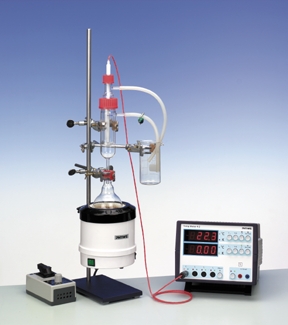Principle
The boiling point of a solution is always higher than that of the pure solvent. The dependence of the temperature difference (elevated boiling point) on the concentration of the solute can be determined using a suitable apparatus.
Benefits
- Simple presentation and execution by temperature meter 4-2
- Simultaneous display of current temperature and temperature difference
- Compact, easily transportable setup
Tasks
- Measure the increase in the boiling point of water as a function of the concentration of table salt, urea and hydroquinone.
- Investigate the relationship between the increase in boiling point and the number of pellets.
- Determine the molar mass of the solute from the relationship between the increase in boiling point and the concentration.
Learning objectives
- Raoult's law
- Henry's law
- Ebullioscopic constants
- Chemical potential
- Gibbs-Helmholtz equation
- Concentration ratio
- Degree of dissociation
Necessary accessories
- Precision balance 620g/0.001g
